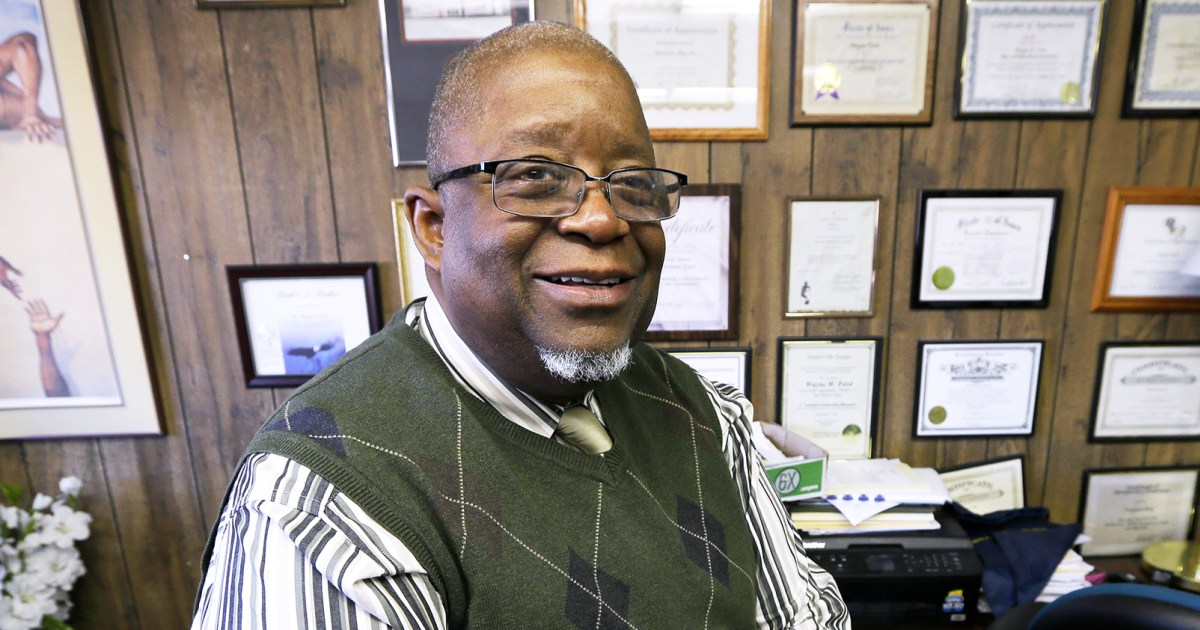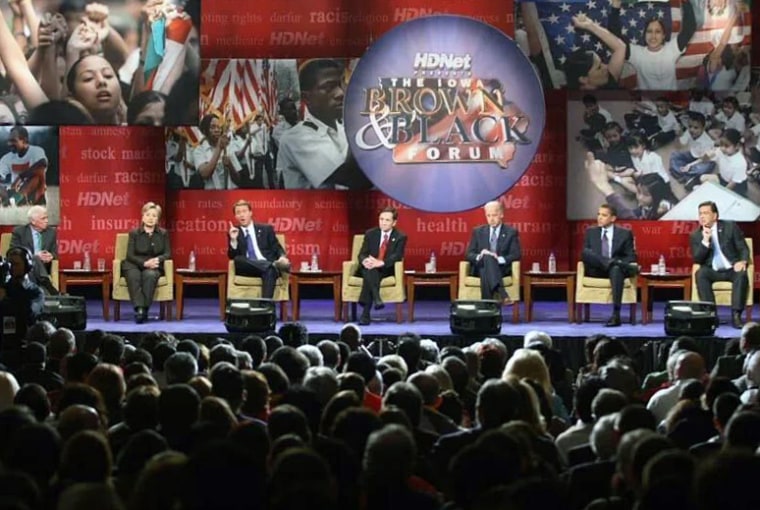
Nearly every Republican presidential candidate has rejected an offer to participate in what the organizer describes as the nation’s oldest minority-focused presidential forum, despite GOP optimism — and repeated campaign trail comments from several candidates — about improving the party’s performance with voters of color in 2024.
For nearly as long as Iowa has held its first-in-the-nation title, Wayne Ford has organized the Iowa Black and Brown Presidential Forum. The event often focuses on issues of national significance, such as crime, education and the economy, but it gives presidential aspirants an opportunity to tailor their message specifically to communities of color. Ford co-founded the organization behind the forum alongside Iowa-based Latina activist Mary Campos in 1984.
Ford, a Democratic former state representative who was working with Iowa Republican leaders to try to put on a 2024 event, said he has extended invitations to Democratic and Republican presidential hopefuls alike since the forum started 40 years ago. But only Democratic presidential candidates have participated so far. Past attendees include President Joe Biden as well as former President Barack Obama, Hillary Clinton, Al Gore, Jesse Jackson and George McGovern.
Ford had reason to think this election cycle might be different: Exit polls have shown Republicans making gains with Black and Latino voters since Donald Trump’s election as president in 2016. But only a few months after extending invitations, organizers for the Republican forum canceled it due to “a low number of committed participants.”
“We’ve reached out to the Republican Party — whether it was Bush, Reagan, it didn’t matter. We always reached out to both parties,” Ford said. “Over the years, we started recognizing that Republicans were not coming but Democrats were.” He added: “I’m disappointed that as of today, we still have not done a Republican forum from the presidential level.”
The latest attempt to host a Republican forum began in the summer, when Ford, with the support of Iowa GOP Chair Jeff Kaufmann, began sending invitations to all Republican presidential candidates, with the exception of former New Jersey Gov. Chris Christie, who Ford noted “said from day one he’s not coming” to Iowa to campaign.
“More dialogue is always a good thing in the political process,” Kaufmann said in a statement at the time. “Republicans are especially keen to engage in conversations with groups such as The Brown and Black Forums of America about how bold leadership and ideas can benefit all Americans regardless of race.”
Nearly every remaining Republican presidential candidate, with the exception of Christie, has held dozens of campaign events in Iowa. But Ford told NBC News that only one offered a firm commitment to attend the forum: Ryan Binkley.

In a statement to NBC News, Kaufmann called the cancellation of the forum “unfortunate.”
“Republicans have always been fierce champions of free speech and the fair exchange of ideas, and I applaud my good friend and Iowa political trailblazer Wayne Ford for attempting to provide another platform to facilitate debate and discussion,” Kaufmann said.
Ford says Vivek Ramaswamy’s campaign, which has notched the most events in Iowa of all presidential campaigns, told him the candidate would put the event “on his schedule and look at it.” Binkley’s campaign said, as Ford recounted, “He’s committed. He’s excited. He will be there.”
Those were the only responses Ford says he received from the Republican presidential candidates.
Binkley told NBC News he agreed to participate in the forum because he “recognized the deep need for reconciliation in our nation, not just politically, economically, but certainly racially.”
“The Republican Party has not really done well with minorities or with young people, or with major cities,” Binkley said. “You may have noticed that we lost 46 of the top 50 cities in the last election. My vision is that we would really dive into urban America with some real solutions.”
NBC News reached out to the five other Republican candidates to learn why they declined to attend the event.
Trump campaign spokesperson Steven Cheung suggested the former president was inclined to continue declining events that would put him on a stage with other candidates, given his polling lead.
“President Trump continues to dominate the race by wide margins. It’s time for everyone to stop wasting time, energy and resources,” Cheung said.
The campaigns for former United Nations Ambassador Nikki Haley, Florida Gov. Ron DeSantis, Ramaswamy and former Arkansas Gov. Asa Hutchinson did not respond to requests for comment from NBC News.
‘A golden opportunity’ left behind
For Ford, Republican candidates’ decision to skip the event is perplexing given the near-record voter turnout among Black and Latino voters in 2020, as well as the shifting margins among those groups.
“This is the highest in the history of America you have minorities voting for a presidential candidate,” Ford said.
There are also signs that more Black and Latino voters, groups traditionally supportive of Democrats, are up for grabs in the 2024 general election — a fact on the mind of some Republicans eager to once again win over a majority of the country.
“We have to go after the people in the middle,” said Christopher Garcia, an Iowa resident who plans on caucusing for DeSantis. “The independents, the Blacks and Hispanics that are falling away from Biden right now. That’s the people we’re gonna have to go after.”
Exit polls and other voter studies showed a small shift among Black voters toward Trump from 2016 to 2020 and a more sizable one among Latinos, particularly among men. While Biden still carried Latinos nationally, it was by a much smaller margin than Democrats enjoyed in other recent presidential elections. And higher-than-normal shares of Black voters are eyeing Trump in recent 2024 polls.
There have been few, if any, attempts by Republican candidates to hold events in predominantly Spanish-speaking communities in Iowa.
West Liberty, Iowa, is a majority-minority rural community that was the first in the state to elect a majority-Latino city council. Cara McFerren, a member of the nonpartisan West Liberty City Council, told NBC News that she has yet to see “any specific correspondence directed to minorities in our area from any candidates from any front running party.”
“Most of the candidates I see that make actual stops in town tend to be from the Democratic Party; while the Republican candidates tend to rally in more metropolitan neighboring cities that like to draw in larger crowds,” McFerren said via email.
Part of that is due to the reality of this early-voting state: Iowa is the nation’s fifth-whitest state, according to census data.
But Ford was hopeful that the shifting demographics of general elections would lead to increased participation. There was also the symbolism behind this year’s caucus date.
“There was a golden opportunity — our caucus will be held on Martin Luther King’s birthday. When we first heard about that, we were very excited,” Ford said. The Black and Brown Forum was set to be held two days prior, on Jan. 13.
Ford believed the caucus falling on King’s birthday sent a “strong message” that could’ve changed the perception of the state, especially in light of the Democratic Party’s decision to remove Iowa’s first-in-the-nation status in its nominating contest.
“Even though we have lost number one for Democrats, even though you got a perception of us as being a red state — even though we are a red state, we still believe in fair equity,” Ford said. “Remember, we’re still the ‘white state’ that got Obama started. We’re the ‘white state’ that got a woman started with Hillary Clinton.”
The forum has in the past been an opportunity to speak to communities of color in Iowa and nationally, through media partnerships. The organization’s last presidential forum in 2020 was hosted by Vice News and won a News and Documentary Emmy.

Given the dearth of polling specific to Black and brown constituencies, Ford throughout his nearly 50 years of organizing minority-focused forums has framed them as an effective way to amplify those voices and the issues they care about. He says it’s also a way to gauge their reaction to various acts on the campaign trail, like Trump’s recent assertion that undocumented immigrants “are poisoning the blood of our country.”
“We have not interviewed minorities who live in Iowa, who are Republicans” to see if Trump’s comments affected his standing or not, Ford said. “That’s why our forum becomes more and more important.”
Organizers for the Iowa Black and Brown Presidential Forum said in light of the cancellation, they will still work to “foster a platform that not only resonates with our audience but also shapes the national dialogue on pivotal issues affecting our communities” through media collaborations during the 2024 election cycle.